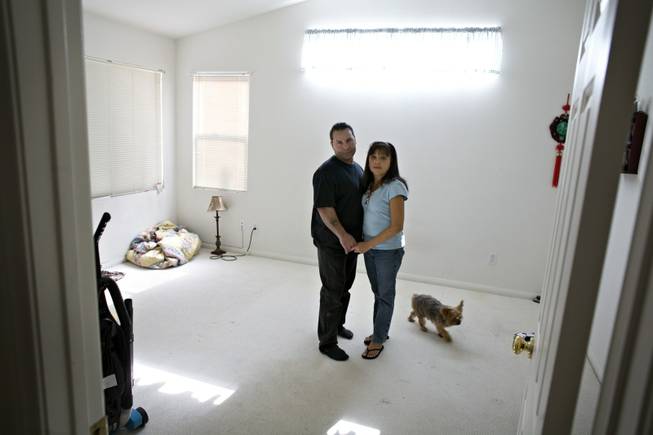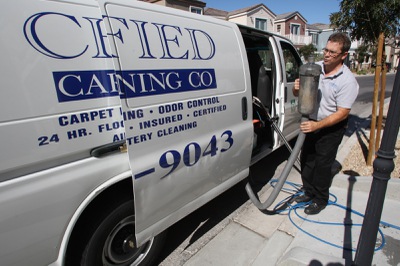
Jack and Elizabeth Safer’s bedroom is almost empty because they had to sell their furniture to pay bills. They’re planning to keep Pebbles, the dog pictured, but give away their Dalmatian, Pongo. Elizabeth lost her job 11 weeks ago and Jeff’s pay at a new job is half of what he had been making.
Sunday, Nov. 2, 2008 | 2 a.m.
Sun Topics
Las Vegas is in a big hurt.
We know the indicators. Homebuilding has all but halted. The state’s population — the fastest growing in the country since the early 1990s — has shrunk. The unemployment rate is 7.3 percent, more than a full percentage point above the national average. Our foreclosure rate is five times the national average.
Numbers, numbers and more numbing numbers.
Maybe the story of the economy is best told one life at a time.
They’re running out of stuff to sell; what will they do to pay bills?
Jack and Elizabeth Safar had been struggling to pay their bills even before she lost her job as a car insurance saleswoman 11 weeks ago. Sometimes they got by. Now, they don’t.
Jack Safar, 40, hasn’t been able to earn more than half the $6,000-a-month salary he raked in as an auto body mechanic before a 2007 eye injury, and his 38-year-old wife, who hasn’t qualified for unemployment, has yet to find another job.
They have no savings, and only $30 in their wallet.
Elizabeth spends much of her time now in the Los Angeles area, where they’re from, hawking DVDs and other possessions at swap meets. They’ve sold about 400 DVD movies, the likes of Spider-Man, The Mummy and X-Men, for $5 or $6 each. She crams dishes, china, silver and whatever else might fit into two pieces of luggage for her $40 one-way bus ride on Greyhound; she can’t afford to drive or fly, and she stays with a friend.
The master bedroom in the house they rent is all but empty of furniture. They sold their 2-year-old, $2,500 bedroom set for $450. A second bedroom also has been emptied, except for the 70 DVDs they have yet to sell.
They are buckling under their living expenses. They’ve got 14 months more on their lease, with rent of $1,250 a month. The monthly payments for their 2002 Ford Focus and a 2004 Saturn Vue total $620.
There’s no way Jack’s salary alone can pay the bills.
They’re not sure how to pay the $93 Southwest Gas bill, and worry about losing their hot water this week.
They’re planning to give away their 3-year-old Dalmatian, Pongo, but keep Pebbles, their 7-year-old Yorkshire.
It’s possible their bedroom set in the guest room will have to go. If so, they’ll be sleeping on the sofas in the living room, near the TV that still broadcasts, perhaps inexplicably, $40-a-month worth of DirecTV. It feeds an older, smaller TV; they sold their big-screen.
This was not the life Jack Safar pitched to his wife in 2007 when they moved here from California on the promise of a good-paying auto-shop job with paid vacation, group health insurance and a 401(k) retirement plan. But several weeks after he arrived at his new job, Jack’s right eye was damaged by a flake of flying metal. He said he lost his job and collected $6,400 in workers’ compensation.
The couple had to cash out the $10,000 in their retirement plans.
After eye surgery, which was paid for through the workers’ comp case, Jack got a job at another body shop but is making only half what he had been making.
That’s when they started visiting pawn shops.
— Brian Eckhouse
Less demand for clean carpet leaves man with lot to pay, little to save
Wally Grogitsky has four teenagers, four dogs, three cats and one 21-month-old foster child with health problems.
He faces $9,000 in bills every month — the cost of his carpet cleaning business, the mortgage, the groceries and utilities and the like. And he’s making only $10,000 a month, so there’s not much left over for emergencies.
Grogitsky used to set aside $3,000 every month — to buy his children new clothes, to go to movies, to fix the family car. No longer.
Two years ago, he might have replaced his broken watch. Not now, though. When a circuit breaker blew in his master bedroom, Grogitsky and his wife went without light in the room for two months before finally hiring an electrician.
Grogitsky had one employee, but he let him go in October. Over the past 18 months, half of the home developers who hired him to clean their model homes have stopped calling. And almost half the real estate agents who called Grogitsky for shampoo jobs aren’t even agents anymore.
He has tense conversations with his wife, who makes a point to remind him, even though they both know, that the mortgage is due again.
“I don’t know if any of the stuff the government is doing will help me,” he said. “I’m going to have to be my own light at the end of the tunnel.”
Grogitsky is a master carpet cleaner, certified in specialty messes: Fire damage, water damage, Persian and Oriental area rugs. He’s been doing it for 14 years. In 2000, his company, Certified Carpet Cleaning, cleared a quarter of a million dollars. Then he was diagnosed with cancer. Then his business partner started embezzling money from the company. Then he divorced his wife.
In 2002, he beat the cancer, lost the business partner and remarried his wife. Certified Carpet Cleaning was back on track.
And then the economy collapsed.
“With the cancer, my mantra was, ‘It’s only temporary.’ I beat the cancer,” he said. “But the economy won’t let you go.”
So he’s getting handyman jobs where he can — unjamming garbage disposals, installing ceiling fans, scrubbing tile grout, installing carpets, cleaning mattresses and couches.
The light at the end of the tunnel looks like a lot of manual labor. He is 48. He’s been getting headaches.
“It’s all a real bummer,” he said.
He’s paying attention to real estate statistics, and it looks like more vacant houses are being sold. That may mean more vacant houses with carpets to be cleaned. “That’s my ray of hope,” he says. “We’re close to the bottom, and maybe things will start turning around.”
Then a client calls. He wants to know if Grogitsky will accept a postdated check. He needs his carpets cleaned, but he doesn’t have the money just yet. It’s a question of about $150. It’s coming in a few days, the client says.
Grogitsky doesn’t have to think. “Sure,” he says. “Whatever I can do.”
— Abigail Goldman
Financial adviser finds his clients, himself in the eye of the storm
The day is almost over on Wall Street, the Dow has dropped again, Jeff Ballek is going crazy.
His phone should start ringing soon.
Ballek is a financial adviser, has been for 27 years. And lately he’s working 14-hour days, hardly has Sunday to himself and for his family, and finds he’s wearing a new hat, though it doesn’t figure in his 10 professional licenses: psychologist.
He listens to people talk about their fears after they see the Dow dip. Will they lose their jobs, their houses? Will the economy ever come back?
He tries not to answer those questions. He doesn’t have the expertise. He just listens.
Then he gets down to business: where or whether their money should be moved from one account to another, or out of one insurance plan or another.
He and his wife, Martha, who works in real estate, are buffeted by the same economic winds.
They moved here from St. Paul, Minn., three years ago.
Ballek was promised a job that didn’t come through and decided to build his own financial company from the ground up, offering services ranging from investment portfolios to life insurance. But by the time things were up and running, the Las Vegas Valley was becoming ground zero in the nation’s foreclosure crisis.
So Ballek’s household economy unexpectedly become a microcosm of the nation’s, because, taken together, he and his wife work in just about every sector that is struggling for air right now: insurance, stocks, credit, houses, mortgages.
The result: Where once upon a time, and for at least a decade, Ballek brought home six figures, now he’s earning about $75,000.
He maintains an office on the west side of town but has closed his Henderson office to save money.
The Balleks took their 6-year-old son out of private school this year for the same reason.
But what he wanted to talk about was not so much his own family but the clients he visits in town, or the ones he listens to on the phone, calling from Minnesota, Washington or Indiana.
There’s the Minnesota husband and wife in their 50s. He’s a contractor, she’s a teacher. He’s afraid he’ll lose his job. So emotions trump intellect. The man doesn’t listen to Ballek’s advice about keeping money in bonds. He doesn’t want to think about the future. He needs some sense of security now.
There are also the clients who call to cancel their life insurance or lower their car insurance because money spent on those premiums seems better spent on other bills.
And, for the first time, Ballek is getting calls from people who really are bottoming out, having lost their homes and their jobs.
Those people need to call someone else, he said — the Salvation Army, for example.
Shaking his head, he admits: “There’s not much I can do to help them.”
— Tim Pratt



Join the Discussion:
Check this out for a full explanation of our conversion to the LiveFyre commenting system and instructions on how to sign up for an account.
Full comments policy